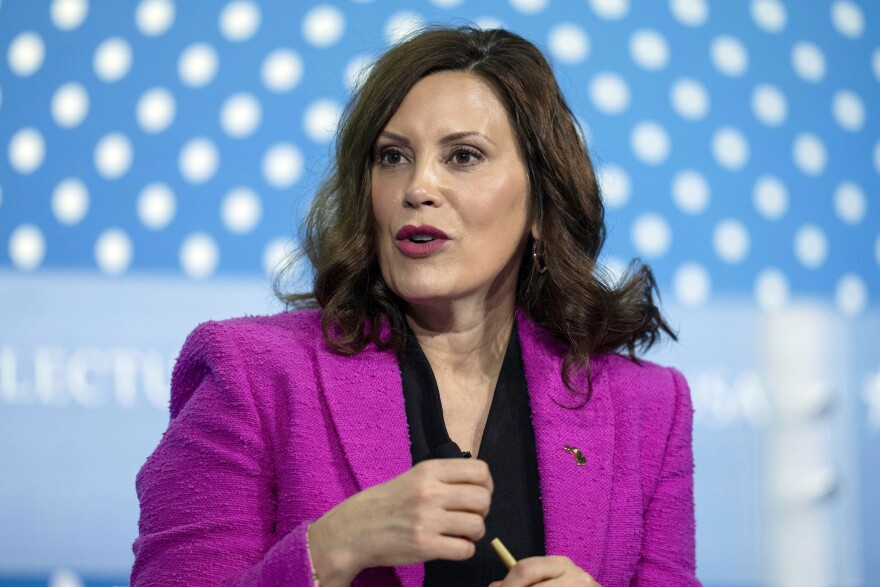Governor Gretchen Whitmer issued an executive directive Wednesday that could lay the groundwork for the state to broaden access to the COVID-19 vaccine, despite new federal restrictions.
But it doesn’t have a whole lot of specifics.
The directive instructs state health and insurance officials to issue “guidance to providers, pharmacists and the public regarding the safety and efficacy” of the shot “for all appropriate populations,” and to remove “barriers to vaccine access to ensure COVID-19 vaccines remain widely available in Michigan.”
But currently, only those over the age of 65 or with an underlying medical condition can get the vaccine without a doctor’s prescription in Michigan. That’s under recent limitations put in place by U.S. health secretary Robert F. Kennedy, Jr.
Whitmer’s directive also says state officials should ensure “to the extent possible that all health insurance plans” under state authority cover the vaccine.
The CDC’s Advisory Committee on Immunization Practices (ACIP) is scheduled to meet this week, where it’s expected to issue recommendations that could mean insurers are no longer required to cover the shot. ACIP’s recommendations also determine which immunizations are covered by the federal Vaccines for Children (VFC) program, which provides free vaccines to kids who couldn’t otherwise afford them. About 50% of kids in the U.S. are eligible for the program.
States like New York, New Jersey, Wisconsin and Minnesota have already issued sweeping orders authorizing the shots to virtually anyone who wants it, in direct defiance of the FDA’s guidance. Massachusetts’ governor is also requiring insurers to cover vaccines recommended by the state health department (though experts say states have limited authority over certain types of insurers.)
Whitmer’s directive takes a “more measured” approach, says Michigan’s chief medical executive Dr. Natasha Bagdasarian.
“Rather than issuing a formal directive that doesn't have teeth, we're working with these partners again to ensure the same common outcome that we are all looking for, and that is to protect the health of Michigan residents.”
And this “was just the beginning,” Bagdasarian said. “This executive directive is a directive to state agencies to start taking action. So you're going to see that action taking place in the next days to weeks. So stay tuned. There is more to come.”
How health insurance coverage could change
Even if ACIP issues recommendations that mean insurers are no longer required to cover certain vaccines, some private insurance companies may still opt to cover them.
“That will be essentially a cost-benefit analysis,” said Sabrina Corlette, a research professor, founder and co-director of the Center on Health Insurance Reforms at Georgetown University. “And so maybe the health plan will say, ‘We'll cover these vaccines, because it's cost-effective for us to do so for our workers and their dependents. But we're not going to cover these other ones, because that's just money down the drain.”
The Association of Health Insurance Plans, a national trade group, announced this week that private insurers would continue to cover the COVID vaccine through the end of the year.
And while states do have some discretion over what, say, state Medicaid plans cover, “frankly, in most states, the majority of people are not in state-regulated health insurance” plans, Corlette said. “They might be in Medicare, which is entirely a federal program. They might also be getting their insurance through their employer. And most large employers, because they finance their own health coverage for their workers, are regulated” under the federal Employee Retirement Income Security Act (ERISA.)
Nor can states determine which vaccines are offered by the federal Vaccines for Children program.
“Depending on the state, we're thinking of 40-50% of childhood vaccines being administered through the VFC program,” said Abram Wagner, an epidemiologist and global public health professor at the University of Michigan School of Public Health.
That could mean that kids with private insurance plans get vaccine coverage, while others can’t afford the shots. “I guess states could maybe decide to have additional funds” to backfill that program, Wagner said. “In Michigan, this would be a bunch of money, which we might not have set aside for that purpose at this point in time.”
But some states are likely going to continue trying to chart their own paths on vaccines, Corlette said.
“In the absence of any sort of credible leadership at the federal level, the only place to look for leadership is at the state level,” she said. “And so I commend the states that are trying to find a way to get people access to these critical and often life-saving vaccines. But I don't know what the right solution is. Because 50 different approaches to this, over time, could really further undermine consumer trust and consumer confidence.”


